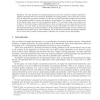Free Online Productivity Tools
i2Speak
i2Symbol
i2OCR
iTex2Img
iWeb2Print
iWeb2Shot
i2Type
iPdf2Split
iPdf2Merge
i2Bopomofo
i2Arabic
i2Style
i2Image
i2PDF
iLatex2Rtf
Sci2ools
286
click to vote
FAW
2010
Springer
2010
Springer
Adaptive Algorithms for Planar Convex Hull Problems
We study problems in computational geometry from the viewpoint of adaptive algorithms. Adaptive algorithms have been extensively studied for the sorting problem, and in this paper we generalize the framework to geometric problems. To this end, we think of geometric problems as permutation (or rearranging) problems of arrays, and define the "presortedness" as a distance from the input array to the desired output array. We call an algorithm adaptive if it runs faster when a given input array is closer to the desired output, and furthermore it does not make use of any information of the presortedness. As a case study, we look into the planar convex hull problem for which we discover two natural formulations as permutation problems. An interesting phenomenon that we prove is that for one formulation the problem can be solved adaptively, but for the other formulation no adaptive algorithm can be better than an optimal output-sensitive algorithm for the planar convex hull problem.
Related Content
| Added | 09 Nov 2010 |
| Updated | 09 Nov 2010 |
| Type | Conference |
| Year | 2010 |
| Where | FAW |
| Authors | Hee-Kap Ahn, Yoshio Okamoto |
Comments (0)

